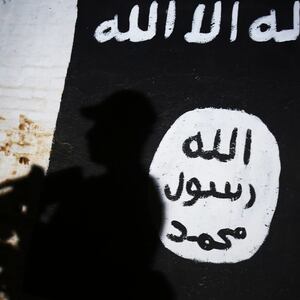Two weeks after she was rescued from alleged ISIS supporters in a camp in Northern Syria, a sweet little girl who was born in Chattanooga, Tennessee, explained that she was all alone in the world—and knew nothing of her parents.
“I only know that my mom died, and my dad died,” the girl, Aminah, said in an American accent. Her little face is inscrutable, like a mask hiding the trauma of being the sole survivor of an aerial bombardment that killed her mother, at least one of her little brothers, and another of her stepfather’s wives.
She has scars on her body from surviving that blast.
A researcher with the International Center for the Study of Violent Extremism (ICSVE) sat down with Amina for her first interview, some of the contents of which were exclusively shared with The Daily Beast. The researcher was given permission to talk to the child by the authorities in the Autonomous Administration of North East Syria (AANES), who are caring for her as preparations are being made for her repatriation to the United States.
Among Aminah’s caretakers is a young Kurdish woman to whom Aminah has already made a strong attachment and to whom she has opened up about her recent traumas living among women still devoted to ISIS.
Ellie Hall from BuzzFeed News discovered that Aminah had been rescued from Camp Roj, located in Northeast Syria, and alerted ICSVE. The rescue operation was launched after a tipoff received by ICSVE adviser and former Ambassador Peter Galbraith, who has been working to repatriate ISIS family members for years. One of the women he is helping return to Canada had told him that an American child was languishing in the camp, in the care of a group of women still loyal to ISIS.
BuzzFeed News reported that Aminah’s birth certificate shows that she is 8 years old, but the girl says she is 6, perhaps demonstrating the way that time has blurred for her since 2014, when her mother, Ariel Bradley, a U.S. citizen, traveled to join ISIS’s so-called Caliphate in Iraq and Syria. Bradley’s Iraqi husband was living in Sweden before taking the family with him back to the Middle East to join ISIS.
At some point after that, Bradley remarried to an Australian doctor after her first husband died. Aminah later fell into the custody of one of her stepfather’s other wives, after her mother was killed in what was likely a coalition airstrike, according to BuzzFeed News.
When asked about her stepfather’s wife, Aminah responds, “I don’t know her; she just takes care of me.” The Kurds, who are now taking care of her, say Aminah has opened up in her newly found safety to the Kurdish woman she trusts, telling her that her alleged ISIS caretaker had beaten and assaulted her. She also said she was forced to do the housework in the tent and take care of the woman’s son. An ISIS detainee, texting me from inside Camp Roj, said Aminah’s last caretaker was known to be with a group of highly feared, still-committed ISIS women in the camp. She had met Aminah prior to the camps, when Aminah was a toddler still living with her mother, and described the girl as sweet.
The Canadian woman who is currently being repatriated told BuzzFeed that Aminah was being hidden from the authorities in a niqab, a face covering that female children usually would not wear, so no one would learn she was not her last caretaker’s real daughter and that she looked “sickly and pale.”
Amina was unresponsive when asked if she could understand Arabic, and clearly preferred to speak in English. She said she did not go to school in the camp, a result of the alleged ISIS stepmother’s efforts to hide the American child from the Kurdish guards at the Syrian Democratic Forces (SDF)-run camps in Northeast Syria. On July 17, SDF soldiers raided and safely brought Aminah out of an enclave in Camp Roj. Such operations have been dangerous in the past, as the ISIS women are often armed with cooking knives, and many have been violent in the camps.
Earlier this year, another young Albanian girl whom ICSVE had been working to repatriate from al Hol went into hiding rather than accept repatriation efforts. Another detainee said the girl had been threatened by an ISIS enforcer inside the camp who said she would be killed before she could be rescued if she accepted repatriation.
The SDF succeeded in rescuing Aminah safely. According to U.S. protocols, which were also carried out in the Samantha el Hassani case—another instance in which ICSVE fought for the repatriation of her four American children—the next step will be DNA testing to formally determine Aminah’s identity, followed by her repatriation to the U.S.
Unlike many other children, Aminah will return to the U.S. alone—her two brothers (both born in Syria, one each from Ariel’s two husbands) were killed alongside their mother. Once returned, Aminah will likely be placed in the custody of her maternal grandparents. There is some debate over whether the parents of those who went to join ISIS would be the best custodians for these children, but grandparents usually do have the legal rights to claim their orphaned grandchildren.
While the U.S. has been lauded for its proactive repatriation policy, many countries have been hesitant to repatriate even the youngest children of ISIS men and women. Their fears are numerous, including the possibility that the children may have been ideologically indoctrinated or trained to use weapons, as well as potential legal difficulties if ISIS mothers and even fathers try to use family unity policies to follow their children home.
Nonetheless, experts wholeheartedly agree that leaving ISIS children in Syria is absolutely the wrong thing to do. As generals, ambassadors, and academics have said, leaving children in the SDF camps places them at greater risk for radicalization and future terrorist action.
Aminah, for example, is clearly not a dangerous terrorist. She is lucky to have been shown care by the unnamed Canadian woman and Ambassador Galbraith, who together worked to save her, and by her newly appointed Kurdish caretaker who is lovingly watching over her while the U.S. government prepares for her repatriation.
Had she not been rescued, however, Aminah would have remained hidden with her stepfather’s wife among diehard ISIS supporters, where she would continue to be exposed to instability, chaos, and brutality.
The longer it takes to be repatriated and rehabilitated, the more likely it is that the children of ISIS parents will learn to hate, to believe that violence is the way to get what they want, to trust militant jihadist claims, and to see their home countries as having abandoned them. Some may even escape or be spirited out of the camps to serve ISIS as willing or unwilling attackers.
The father of Samantha el Hassani’s eldest child, Matthew, who was taken from Indiana in the U.S. to join ISIS by his ex-wife and her new husband, told me that he had been nervous about helping to bring his own son home. He wondered if Matthew would be equipped to overcome the grief of being removed from his now incarcerated mother, the ideological training he may have had, and the possible stigma he would face upon his return to the U.S.
As a 9-year-old, the boy had been used as an ISIS propaganda tool by Samantha el Hassani’s new husband, who forced the child to train with automatic weapons on camera and denounce the U.S. Speaking recently in the documentary film Return from ISIS, Matthew now refers to his past life as a faraway unreality that he is gradually overcoming with the help of a loving father who takes him camping and fishing.
To get back on track, these young people will certainly need caregivers who are loving, nurturing, and patient, and who guide them slowly and safely into a world that is completely alien to them.
Aminah’s rescue was unique, but her case should not be. These children have lost parents and siblings in battles and bombings; they have seen dead bodies; they have been denied their basic rights to safety and education, not to mention their legal rights.
All of this was done to them by and because of ISIS, but in 2021, their circumstances reflect not only ISIS’ immorality and brutality, but also that of countries and governments all over the world that refuse to save them. Repatriating and rehabilitating these children will be a challenge, but it is one that cannot be ignored.





